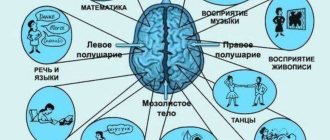Correct thinking is the key to personal success. According to psychologists, it involves a focus on results rather than avoiding failure. People who think positively achieve positive changes in their lives much faster. The article will talk about how to learn to think correctly and enjoy it.
- Get rid of negativity
- Love knowledge
- Train your thinking
- Be open to new experiences
Albert Einstein: “Find new ways to use ordinary objects”
A great way to develop breadth of thought and stimulate a brain tired of routine. Choose one item every day and come up with creative ways to use it. And bring to life the most interesting one, in your opinion.
Make an hourglass out of a holey sock? Yes, easily! A mousetrap made from a hairpin? Great idea! Try it - it's a fun, easy and exciting way to become smarter. In the end, the creator of the theory of relativity will not advise anything bad.
Just please don't hammer nails with a microscope.
I recommend that you take a look at the Wikium site and wander around. You will find a large number of courses, simulators, useful articles on the development of thinking, imagination and memory. I will return to this project at the end of the article.
Think in the game
There are a number of entertaining games that “pump up” our brain. All kinds of crosswords and puzzles will be excellent “weights” for him. In addition, on the Internet you can find an endless number of different games that force us to analyze, compare, remember and plan. Many modern computer games are the answer to the question of how to learn to think quickly. In many of them, winning requires a good reaction and the ability to make decisions instantly.
Such unfairly forgotten board games as chess, checkers and various card games are great for developing logic. Don't neglect them. There are also all sorts of board games on sale that require participants to pay attention, develop tactics, and develop their own strategy. Such a fun and exciting path to self-development is certainly worthy of special attention.
Steve Jobs: “Do meditation”
The Apple founder was seriously interested in Eastern philosophy and even professed Buddhism. Meditation helped him focus and relieve stress. They also opened the door to knowledge that was inaccessible to rational perception. Here's what Steve said in an interview:
“If you just sit and contemplate, you will notice how limitless your thinking is. If you try to calm him down, you will only make things worse. After a while, it will calm down on its own, and you will gain control over it. At this moment, intuition awakens, and you see everything around you much more clearly and deeply than you saw before.”
I guess I'll follow his example right now. Which is what I advise you to do. I just have a suitable video in stock.
Can you build sentences?
Even if a person knows many different words, but has difficulty constructing sentences, then listening to him is boring and uninteresting.
To learn how to construct sentences, retell movies and books more often to friends or to yourself. Watch your speech patterns, do not pour water, speak briefly but clearly.
Add emotions, watch your friends' reactions. If your story is bad and uninteresting, then their attitude towards your story will immediately be reflected on their faces.
To become an interesting conversationalist, this technique will help: write down in your diary your impressions of a movie you saw or a story you read. Do this as often as possible until you like the sentences you use to express your thoughts. Make sure that parasitic words: “like”, “this”, “so to speak” disappear forever from your vocabulary.
Dmitry Mendeleev “Broaden your horizons”
The famous Russian scientist did not limit himself to chemistry alone. His interests included physics, geology, meteorology, and hydrodynamics. This breadth of knowledge and depth of immersion in the topic helped him reach a new level of thinking. The result of logical reasoning, analysis of information and identification of objective patterns was the same table.
Take this advice and start taking an interest in something outside of your core area of expertise. These could be disciplines related to your work or something completely new to you. Fresh information will shake up your brain and make it work at full capacity. In addition, this method will help you develop your memory.
Come up with exercises for yourself
There are many other answers to the question of how to learn to think for yourself. Use your imagination and come up with tasks for yourself that will help you perceive ordinary things and situations in a completely new way. For example, experts advise taking new routes to work each time, going to different stores, and replacing your everyday phrases with new ones that are unusual for you. Studying a foreign language and reading books improves mental abilities. Try to periodically change the format of your usual films and music - introduce something new into your life.
Don't immediately believe everything they tell you. Research the issue yourself, ask those who know more about it, and then, having a sufficient number of facts, draw your own conclusions. This may take some effort and time, but it will definitely add wisdom and experience. Always try to have your own fact-based opinion.
Anatoly Wasserman “Learn to evaluate information”
The famous scholar advises first of all to pay attention to information that contradicts your beliefs and views. In most cases, your knowledge will be enough to detect inaccuracies and errors in it.
If you cannot immediately refute information that disagrees with your views, rejoice. You have a chance to expand your understanding of the world and enrich your own knowledge.
He gives the example of the “cholesterol-free” label on a bottle of sunflower oil. What is she telling you? If you know that vegetable oils, by definition, cannot contain cholesterol, the meaning of this inscription boils down to one thing: the manufacturer is taking you for an idiot.
Wasserman also advises everyone to read four books to form a holistic picture of the world:
- “Anti-Duhring. Dialectics of Nature” Friedrich Engels;
- “The Sum of Technology” Stanislav Lem;
- “The Blind Watchmaker” Richard Dawkins;
- “The Science of Parallel Universes” by David Deutsch.
Develop positive thinking
If you want to truly develop as a person, avoid negative thoughts, as they extinguish even the most ardent aspirations and significantly reduce your potential. In addition, anger, resentment, disappointment and envy have an extremely negative impact on human health, causing problems with the circulatory and digestive systems, headaches and insomnia, as well as various emotional and mental disorders.
But how can you learn to think about the good? First of all, you need to make it a rule to carefully monitor the constantly changing thoughts in your head. As soon as you come across a negative one, immediately stop it and replace it with a positive one. Never allow thoughts to fly around chaotically in your head on their own. Such conscious efforts will inevitably result in you developing the habit of thinking positively about everything over time.
Until you develop a strong habit of positive thinking, surround yourself with those who already do so. Always, even when you are not in the mood at all, keep a sincere smile on your face, have a friendly and grateful attitude towards everyone. Notice all the beauty of the world and all the good things that happen to you.
Nikola Tesla “Appreciate solitude”
The great physicist liked to repeat: “Be alone - only in it are brilliant ideas born.” He made most of his discoveries alone. Like 9 out of 10 great scientists. Only in solitude can we immerse ourselves in deep reflection and comprehend the essence of the phenomena under study.
By the way, Bill Gates actively uses this advice. Once a year he goes to a secluded corner of the planet to immerse himself in reflection away from the hustle and bustle. He returns from there full of ideas and inspiration.
I'm not asking you to become a hermit and stop communicating with people. You don't even need to specifically find time to be alone. You may simply be using the solitude you already have more productively. Think less about all sorts of nonsense, don’t wander aimlessly on the Internet and don’t stare at TV, but think about philosophical topics. Or think about implementing some idea.
Beautiful speech is another path to success
A successful person must be able to speak beautifully. Oratory skills are necessary for negotiating, establishing contacts, and will also be useful in your personal life. Fluent, competent speech will give confidence, increase self-esteem, and allow you to have a convincing effect on your interlocutor.
What helps you learn to speak correctly? Various techniques will come to the rescue.
Establishing correct breathing
If the diaphragm is poorly developed, then it is difficult for the speaker to speak clearly and beautifully. It is necessary to do breathing exercises:
- Shoulders motionless, short, light inhalation to expand the lower chest. At the same time, the stomach rises slightly.
- This is followed by a smooth exhalation.
- First, you will have to control your breathing by placing your palm on the diaphragm.
Proper breathing will allow the air to be evenly distributed, which will make speech pronounced clearly and concisely.
Diction development
It is more difficult for an adult to change an already developed diction. To develop intelligible pronunciation, you can use different techniques:
- Tongue Twisters. Repeat every day, first one tongue twister, until you reach automaticity, then another.
- Breathing technique. Inflate the balloons by exhaling vowel sounds for a long time.
- Recording on a voice recorder. Work on conversation defects until they disappear.
- Articulation
Gymnastics will help make judgment expressive and clear
Do the exercises 10-15 times.
- Smile and say the sound “i”. Start with 5, work your way up to 25 seconds.
- With your mouth open, move your jaws back and forth.
- Cross your arms over your chest. Bend your torso forward, pronounce the sounds: “o, u, s.” Gradually lower your voice and draw out your vowels.
- Keep your mouth open and use the tip of your tongue to touch each tooth in turn.
- Relax your tongue and lick your lips.
- Place your tongue on one or the other cheek. Repeat the exercise first with your mouth open and then with your mouth closed.
Elon Musk “First study the problem thoroughly and only then begin to solve it”
The genius of the 21st century criticized the existing education system in one of his interviews. According to him, it focuses on learning tools for solving problems, and does not pay enough attention to the problems themselves. As a result, we end up with narrow-minded specialists who are unable to solve non-standard problems.
He cites training for auto mechanics as an example. Without forming a clear idea of the engine structure, they are taught to use screwdrivers and wrenches. It is much more effective, according to Musk, to first study the engine from all sides, and then manipulate it.
When the SpaceX program existed only as an idea, Elon first studied the aerospace industry. For several months he studied books on the physics of space flight, and then independently calculated the cost of all the parts and the launch of the rocket. He demonstrated through his own experience that it is always a good idea to think things through before doing anything.
How to apply his advice in life? For example, you need to solve some practical problem. Change the socket or make the dough more fluffy, for example. Before Googling ways to solve a problem, get to know the object you will be dealing with better.
Once you gather the information, you may find several ways to achieve your goal. And in global terms, learn to think independently and think faster with your head.
Main rules of logic
The most important thing is to realize that there are two main types of reasoning: some of them are the most reliable, and others are not so much. The former are called deductive reasoning, the latter - plausible. Paradoxically, ordinary people for some reason prefer to use plausible rather than deductive reasoning.
There are a number of deductive arguments that simply need to be mastered.
Conditional categorical inferences
The conditionally categorical type of reasoning includes two correct ones: modus ponens and modus tollens.
Modus ponens.
This reasoning has the following structure:
"if A
, then
B
";«A
" means "
B
".
Logicians are interested in the very structure of these reasonings, but in reality they do not always appear to us in exactly this guise and can take on different linguistic and rhetorical forms. In human language it might look like this:
“if the Russian team wins against Spain, then I will get a tattoo”;
“The Russian team won against Spain” means “I’ll get a tattoo.”
Modus tollens.
This reasoning goes like this:
"if A
, then
B
";"not- B
" means "not-
A
".
Let's translate again:
“if the Russian team wins against Spain, then I will get a tattoo,”
“I didn’t get a tattoo” means “the Russian team didn’t win against Spain.”
It may look a little different: “if A
, then
B
” means “if not-
B
, then not-
A
.” In this form it is called “contraposition.”
For example, at the recent International Economic Forum in St. Petersburg, during a panel discussion, Alexey Kudrin used the mentioned modus tollens to demonstrate that anti-Russian sanctions are one of the significant factors influencing the rate of economic growth of the Russian economy, despite the fact that the government sets quite ambitious goals by its increase. Kudrin notes: “Now, after the latest wave of sanctions, their influence has increased to approximately 0.5% of GDP. Here, too, we must see that our tasks and plans are reduced by such foreign policy risks.” Within the framework of this remark, it is possible to reconstruct the notorious “contraposition”, thanks to which Kudrin came to this opinion: if economic sanctions are applied to Russia, then the growth of its economy decreases; Therefore, if economic policy is aimed at increasing economic growth, then economic sanctions should not be applied to Russia. And he did the right thing!
Very often, many of us make mistakes and use the following incorrect conditional categorical reasoning:
“if A, then B”; "B" therefore "A". And “if A, then B”; "not-A", therefore, "not-B".
An example is the erroneous reasoning of Alexey Venediktov during the release of his program “Minority Opinion”, in which he discussed with Ksenia Sobchak. In this fragment, Sobchak talks about what reforms of the judiciary she will carry out if she wins the presidential election. In response to this, Venediktov claims that after this speech, the electorate represented by “judges and members of their families” will not vote for Sobchak.
Venediktov’s reasoning can be reconstructed as follows: “if Ksenia Sobchak comes up with proposals that are attractive to voters, then these voters will vote for Sobchak”; “Sobchak does not come up with proposals that are attractive to voters,” therefore, “these voters will not vote for her.”
At first glance, it may seem that this reasoning does not contradict any logic, but this is not so.
The fact is that deductive reasoning has an essential characteristic, which makes it very reliable: in it, from true
premises necessarily follows
a true
conclusion.
In other words, for correct deductive reasoning there is no situation in which its premises will be true
and its conclusion will be
false
. For the type of reasoning that Venediktov uses in this case, such a situation with true premises and a false conclusion exists.
To make sure of this, we need to give a counterexample. For example, here are two premises: “if the Russian team wins against Croatia
, then
I will get a tattoo
”, “
the Russian team did not win against Croatia
” - from these two premises it does not at all follow that “
I did not get a tattoo
”, since I could have gotten this tattoo for completely different reasons: out of pride in Akinfeev’s leg, out of regret for his right hand, which almost saved one of the penalty kicks, etc. Indeed, both premises are true statements, but the conclusion in this case turns out to be false.
Many may have doubts whether the already mentioned correct types of reasoning: modus ponens and modus tollens will withstand such a test for lice. Well, try to find counterexamples to them (in logic there are more accurate and convenient methods for checking the correctness of reasoning, but, unfortunately, they cannot be considered within the scope of this article).
Reduction to absurdity and reasoning by contradiction
There are other methods of reasoning in logic: these are the so-called indirect inferences. There are two cool techniques among them, they are called “reduction to absurdity” and “proof by contradiction” (they are actually the same thing).
Reduction to the absurd.
We want to refute some statement "A". Armed with the technique of reductio ad absurdum, we must assume that proposition "A" is true - and then try to use some reasoning to demonstrate that this assumption leads to a contradiction. If we manage to arrive at a contradiction, then our initial assumption was incorrect. Thus, we refute statement "A".
Proof by contradiction.
It is constructed a little differently: the initial goal is not to refute “A”, but to substantiate “A”. To achieve this goal, it is first assumed that “A” is false, and then everything is the same: a contradiction is derived that allows us to justify the incorrectness of the original assumption.
People often use these two reasoning techniques. Consider, for example, the “by contradiction” method.
We will assume that you are interrogating a person suspected of murder. The crime was committed with a pistol that was found in the suspect’s apartment.
The latter, of course, denies his involvement and has no idea who the real killer was. In addition, he claims that he spent the entire ill-fated day at home. In order to strengthen your argument in favor of the suspect's guilt, you assume
that the gun really wasn't his. From this assumption we can conclude that the gun was planted on him. But in this case, the suspect must have known the killer or been absent from home at some point on the day of the murder. Both of these alternatives contradict the suspect's testimony, which means your assumption that the gun does not belong to him is incorrect. Therefore, the gun still belongs to the suspect.
Aristotle “Learn to assimilate a thought without accepting it as truth”
In other words, learn to think critically. In a continuous flow of information, it is very difficult to separate truth from lies. Don't take everything for granted. Especially something about which you have very little information.
Remember that many people try to manipulate the minds of the masses to achieve their own goals. Therefore, always check the information entering your head according to the following criteria:
- the presence of specific facts (dates, numbers, names);
- indication of source;
- objectivity of presentation (lack of assessments, emotions, interpretations of the author);
- reputation (opinion of people and communities authoritative in the field).
But even the information meets all the above criteria does not guarantee its 100% truth. Therefore, conclusions often have to be made on a whim, relying on a sixth sense.
How to overcome laziness
Many of those people who wonder how to learn to think are actually good at it, but simply do not use this magnificent ability. The reason for this is simple to the point of banality - mother laziness. Mental activity sometimes absorbs as much energy as hard physical labor. Therefore, while protecting its energy reserves, the body has difficulty agreeing to make such sacrifices. This is why it is sometimes so difficult for us to force ourselves or our children to think, this is where laziness comes from.
If our goal is not degradation, but personal growth, we must make every effort every day to force our brain to work. Don’t be afraid to overtire it – the brain never gets tired, only we get tired. But remember that the more tired we are from intense thinking, the smarter and more developed we become. Our memory and intelligence also improve. We become more self-confident, interesting and useful to others, and our lives become more exciting and happier.
Mark Zuckerberg “Play sports”
The Facebook founder works out at the gym five times a week. He admits that sports not only helps him keep fit and feel good. During classes, Mark comes up with many interesting ideas that are worthy of implementation.
Follow his example if you haven’t already. During exercise, blood circulation improves and hormones are released that stimulate brain activity. Use sports as a dope to develop your thinking if you want to achieve results faster.
Vladimir Bekhterev “Communicate with young children”
The list of advisers is completed by the luminary of Russian psychiatry, Vladimir Bekhterev. Not only was he a man of incredible intelligence, but he also understood the workings of the brain like no other. Therefore, pay special attention to his advice. Moreover, it is not only useful, but also incredibly pleasant.
A child’s fresh, unbiased view of the world, the continuous “why” and childish inquisitiveness force an adult to constantly think. This training is good because the nature of the load changes all the time. One minute you're teaching a little guy how to build a house out of blocks, and the next minute you're trying to explain why the sky is blue. In this case, you need to formulate a thought in a language that the child understands before you start speaking.
In the process, the brain experiences a good load, different parts of it are involved. Imagination, logical thinking, memory, attention develops. And sincere children's emotions serve as a pleasant addition to the training.
Write it down (even if you don't read it again)
Come on, quickly, when was the last time you wrote something? When did you sign your passport? When you parked in the second row and left a note for those you blocked - so and so, parked, went to get matches, here’s the phone number? Any of the selected works of Yesenin (or, as an option, Mayakovsky) on the wall of the entrance? In our age of smartphones, SMS and social networks, few people even know how to blackmail the prodigal bosses with the help of notes elegantly handwritten on a piece of paper. And it’s a shame, because by doing so we sacrifice an effective method of using motor memory to remember abstract information.
Method:
The process of writing by hand causes a surge in the activity of the nervous system, which is not worth even dreaming of for those who simply “peck at the keyboard.” In an experiment conducted at Indiana University, first-grade students learning the alphabet were assigned to two groups. The first was shown the letters and explained what was what, and the second was also forced to practice writing those same letters. When the kids were stuffed into a magnetic resonance imaging scanner, the brains of the “writers” glowed like Chernobyl cabbage. Brain activity was not only increased, but also resembled a picture of fully grown homo sapiens, although without adult nonsense, like “since I’m in this box, maybe you should check my cholesterol level?”
In other words, this method is similar to the Loki method described above. Similar in the sense that we can use an extra part of the brain to help with memory. The keyboard was invented because typing is faster and easier than writing by hand. But at the same time, we sacrificed the unique ability of the manuscript to imprint information in memory. Remember those cards with words for memorization? Instead of printing the cards, sign them by hand. Plus memorization is guaranteed.
Research confirms that this method is especially effective when working with completely incomprehensible letters or numbers: programming languages, hieroglyphs, hot water bills, etc. Let us repeat: complex hand movements engage motor memory, enhancing the memorization effect.
So, you can eat with your head and remember. But that is not all! The following example will be of interest to those of us who have a pronounced temperament.
Several useful things from Vikium for all those who want to learn to think
I am returning to the site that I recommended to you at the very beginning of the article. This is a great help for all those who want to become smarter.
There are courses and simulators on Wikium. The courses are paid, but most of them are very cheap - from 990 to 1,690 rubles. There are only about 10 courses. The simulators are completely free, there are more than 90 of them on the website.
First I will recommend courses to you, then I will list a few top trainers.
Development of thinking
Description . The training is generally aimed at developing your thinking. The course teaches you to work with different types of information, be more thoughtful and attentive, and concentrate on tasks that require a lot of mental activity.
The first material - about how to overcome apathy forever - is sent by the authors of the course for free - go to the training page, enter your email address and wait for the letter.
When you complete the training, you will be able to easily count in your head, construct your speech competently and convincingly, find solutions in difficult situations, and skillfully argue your point of view. These skills will be useful to you in absolutely any field.
Authors : Vikium project specialists.
Cost : only 990 rubles. Hurry before the price goes up.
Find out more and sign up
Development of creative thinking
Description . Here the material is narrower, the emphasis is on the development of creative thinking. You will develop creativity in yourself, even if you have not previously engaged in creativity at all in any form. Please note that the teacher is a mathematician by training.
The material is presented in video format; there is also text information, diagrams and tables, and many practical exercises.
You will get the ideal result if you combine this course with 2-3 free exercise machines, which I recommend below.
Author : Sofya Kosyak.
Cost : 990 rub.
Find out more and sign up
Emotional intellect
Description . A person who knows how to think must be able to subordinate feelings to reason. The course will teach you to recognize the emotions of other people and better control your own emotional manifestations. After completing the training, you will be calm in conflict situations and confident in yourself when communicating with other people.
The program includes 20 lessons, which are 80% practical. You will find here many techniques, exercises, tests, and simulators.
Vikium takes its products seriously - purchase with confidence.
Author : Oleg Kalinichev.
Cost : 990 rub.
Find out more and sign up
Mentalist
Description . The course will help you become a more thoughtful person in a short period of time. You will develop logic, be able to find non-standard solutions to complicated situations, and easily see cause-and-effect relationships in a variety of problems and conflicts.
The training is aimed at teaching everyone to “see ahead” - to predict the actions of themselves and those around them.
You will find here several problems for practical practice, a huge number of logic exercises and puzzles of various types, and tests.
You will count in your head, think through your actions in advance, like a professional chess player, without resorting to any auxiliary means. It will be useful in both life and career.
Authors : Vikium project specialists.
Cost : 990 rub.
Find out more and sign up
Mnemonics
Description . Mnemonics help to remember information that is difficult to memorize: names of a large number of people, numbers, mathematical formulas, words and grammatical structures of a foreign language.
The essence of the techniques is the creation of vivid associations that help to imprint the necessary information in memory and associate it with something. In 15 lessons you will learn several mnemonics at the same time; they will open the doors to a wide variety of areas of knowledge.
The administration sends the first course material for free - enter your email address and start studying. You will be convinced that the course is a must-purchase.
You can start practicing techniques on simulators - the teacher will give links to 7 different types of simulators, you can practice on them daily if you have the time and desire.
Authors : Vikium project specialists.
Cost : 990 rub.
Find out more and sign up
Polyglot
Description . If you want to become smarter and immediately find a use for your mind, start learning a foreign language. The “Polyglot” course is a collection of exercises that help you find the “key” to all languages, learn them as quickly as polyglots, federal translators, and world leaders learn.
You will know how to memorize words correctly, how to quickly figure out complex grammatical structures in your head, how to work on pronunciation, and “grasp” texts in a foreign language.
The course is universal. After it, you will be able to take up English, French, even Chinese and successfully learn it, start speaking in the first 2-3 weeks of classes.
Authors : practicing psychologists and linguists from the Vikium team.
Cost : 1,690 rubles.
Find out more and sign up
Brain fitness
Description : The most expensive Vikium course. You pay not so much for the course, but for a special device - a neural interface. It can be purchased separately, costs 11,990 rubles. The neural interface reads electromagnetic waves that come from your brain and sends them to the Vikium platform for analysis.
Reading can occur when you are doing creative work or doing some kind of calculations, when you are resting, cooking, worrying about something, and so on. All data will be analyzed and the site will create personalized advice for you.
The good thing about the course is that it is “tailored” to you personally. You will learn how to calm down, concentrate, distribute your workload - and absolutely all the advice will be adjusted to your “biorhythms”.
In addition to the neural interface, you will work on neurosimulators - these are unique programs that train your brain in different directions. Go to the course page and see what it all looks like.
Authors : psychologists and programmers of the Vikium service.
Cost : 12,990 rubles.
Find out more and sign up
I introduced you to the best training programs. Now I will recommend you several simulators, they are completely free:
- Aquarium - teaches you to concentrate on one subject and not be distracted by others. Trains memory and attention, helps to better remember lectures and instructions from superiors.
- Detective - you will associatively connect the word and the image. The program will improve your imaginative thinking, increase your active vocabulary, and teach you to better understand texts.
- Stories - improve your verbal and logical memorization. Learn to keep large amounts of information in your head that cannot be expressed in formulas.
- Cat and mouse - the simulator is aimed at the simultaneous operation of two hemispheres of the brain. The left will be responsible for analytical memory, the right - for the perception of shape, color, etc.
- Master of words - you will learn to work with words, “feel” them better, remember them, and construct statements correctly.
- Memory matrices are needed primarily for those who study foreign languages or plan to do so in the future. Matrices will help you learn grammar and pronunciation correctly, move from memorizing words to speaking, and so on.
- Mosaic - improves voluntary attention. You will look for some object, learn to quickly refocus from one element to another, and concentrate.
- Paired associations - the so-called “working” type of memory will develop, which is needed to solve logic problems and understand some particularly complex material.
- Counting - the simulator is aimed not so much at counting as at searching for an element; its structure is close to Mosaic.
- Continue the Row is an ideal exercise machine for those who want to learn how to count quickly in their heads. You will continue different series of numbers and learn to quickly make calculations, remember that, for example, 7+5=12, 8+6=14 and so on.
The Wikium site is really cool. In addition to the well-developed content, it is also very nicely designed - I psychologically relax when I come here. Don't pass by - register, add the project to your bookmarks and begin your path to perfection.
Expressiveness and Confidence
You cannot express your thoughts beautifully by wagging your tongue sluggishly. Just remember: at least once have you admired an insecure person muttering under his breath?
Another thing is charisma. Posture, lively voice, correct accents and no confusion. To bring yourself closer to the model of an ideal speaker, you can use the following tips. [adsense1]
#1. During a conversation, do not concentrate on yourself, do not think about your appearance. Focus on what you want to say.
Visualize the object, savor your knowledge. At first you will have to make an effort to hold onto your thoughts, but then it will be automatic.
With this method, you will reduce your anxiety level and become fully invested in the conversation. At one point in time, the brain can only hold one thought , and when you forget about the possibility of making a slip of the tongue or being blunt, the words will flow out on their own. This happens because the brain completely focuses on the conversation , which means it selects sentences faster.
#2 Voice recorder / camera
Record your speech on electronic media so you can listen to it from the outside. First, the voice will seem unfamiliar, second, you will immediately hear your shortcomings.
It can be:
- Parasite words
- Long pauses
- A large amount of “water” in conversation
- Uncertainty and weak voice
Once you recognize the problem, it will be easier to deal with it. You'll learn what to focus on so you don't try to improve everything at once.
#3 Feel the mood
- Say goodbye if the person wants to leave
- Change the subject if the person is bored
- Show your knowledge if there is an important person in front of you
Be on the same wavelength with the person so that he remembers you as a pleasant interlocutor. Among the annoying and boring storytellers, you will stand out.
#4 Don't try to please
The best confidence is not being afraid to be real. You will only harm communication if you bend and flatter.
Naturalness inspires trust . The simpler and more relaxed you are with yourself, the faster you will join the conversation. And the easier it will be for you to express the desired thought.
#5 Magnetism
Your speech should attract attention in every way. Somewhere you need to stop, somewhere you need to increase the volume, somewhere you need to insert a digression. Don't let the person fall asleep, let him feel your story.
Here are some quick ways to brighten up your conversation:
- Gesture actively
- Include facial expressions
- Insert jokes or stories
- Make accents
- Break your speech into small paragraphs
The most important thing is don’t be shy! If emotionality comes from within , then you will only win. This will show your honesty and openness, which will play into your hands in the future.
#6 And finally
You won't learn to ride a bike without falling. Don't be afraid of mistakes and don't focus on failures. The interlocutor has his own problems , and he doesn’t care about your passages.
The person will either understand you or smile. But in any case, he will forget about it in 5 minutes.











